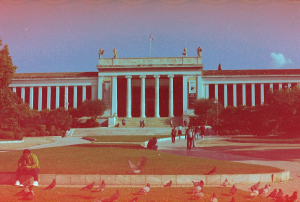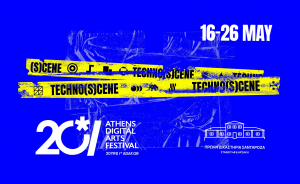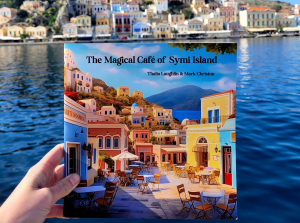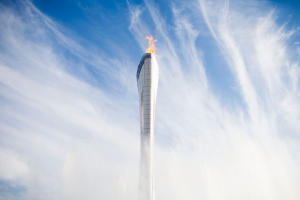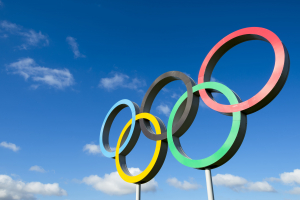BUSINESS CENTRE
XpatAthens
Tuesday, 16 April 2024 14:40
CHEAPART Athens Presents: Sinthome
The exhibition «Sinthome» curated by Helen Mesadou opens on Friday, April 19, in the frame of The Athenian Way/Athens Intersection coordinated by Georg Georgakopoulos and APART Art Research & Applications, in collaboration with the Friends of Trigono Athens F.O.T.A. and CHEAPART.
Sinthome highlights the diversity and contrast found in the world of art through a dialogue between different expressions and aesthetics. The title illuminates the concept of synthesis as a cohesion of opposites and mergers, offering an intriguing and multi-dimensional world that invites the viewer to explore the boundaries of contrast. Through the lens of photography and the materiality of sculpture, the bright and the dark, the positive and the negative, are revealed, creating a world that reflects the complexity and beauty of the human experience.
Sinthome is a Lacanian neologism associated with the symptom, the synthetic-artificial man, the saint, Saint Thomas. sinthome can also be read as synth-home in the sense of an artificial construction of oneself. Sinthome is a combination of language and pleasure, a symbol imbued with pleasure, much like a compulsive tic.
"The symptom must be defined as something that is signaled as knowledge already there in a subject who knows that it concerns him but does not know what it is" Jacques Lacan, séminaire XII, Problèmes cruciaux pour la psychoanalyse, séance du 5 Mai 1965, inédit.
17 artists invite you to discover this multi-dimensional exhibition and immerse yourself in the world of contrasts and synthesis through the eyes of the artists who created these works.
Curated by: Helen Mesadou
Artists: Chrysalena Antonopoulou, Agapi Chrysochou, Nefeli Chyntiraki, Eugenia Efstathiou, Myrto Grigoriou, Niki Iliopoulou, Alexandros Kontogeorgakopoulos / George Kontos / Odysseas Klissouras, Vasiliki Kousteni, Marilena Kranioti, Daphne Mamouri, Nikos Nikopoulos, Natassa Pantazopoulou, Niove Sfiri, George Skouloudis, Nikos Venetopoulos.
Performances:
20.4 / 19:00 Angeliki Manta
21.4 / 19:00 Apostolis Filippou, «Soundlandscapes»
27.4 / 19:00 Athanasia Tsopanargia «Bruise»
28.4 / 19:00 Maria Zourou «Trans.Human.in decomposition II»
The Athenian way
Drawing from the red and black-figure vases as a typical commercial product of classical Athens and earlier, the visual elements of positive and negative transcend time and enter into the present day. Two facets of Athens' identity—the positive and the negative—are viewed from different perspectives. The city's inhabitants tend to magnify the faults with an almost dramatic quality that is oblivious to their benefits. Positive developments do not impress us; the negatives catch us off guard. Two exhibitions explore this phenomenon, as the artists define in form, and the impact it has on our daily lives: our surrounding environment is shaped by our interpretations of it.
Performances:
20.4 / 19:00 Angeliki Manta
21.4 / 19:00 Apostolis Filippou, «Soundlandscapes»
27.4 / 19:00 Athanasia Tsopanargia «Bruise»
28.4 / 19:00 Maria Zourou «Trans.Human.in decomposition II»
The Athenian way
Drawing from the red and black-figure vases as a typical commercial product of classical Athens and earlier, the visual elements of positive and negative transcend time and enter into the present day. Two facets of Athens' identity—the positive and the negative—are viewed from different perspectives. The city's inhabitants tend to magnify the faults with an almost dramatic quality that is oblivious to their benefits. Positive developments do not impress us; the negatives catch us off guard. Two exhibitions explore this phenomenon, as the artists define in form, and the impact it has on our daily lives: our surrounding environment is shaped by our interpretations of it.
Published in
Art
Tagged under
Friday, 26 April 2024 14:23
20th Athens Digital Arts Festival: TECHNO(S)CENE
20 years of digital revolution in Athens. A unique immersive experience.
The Athens Digital Arts Festival, the first and largest international platform for digital arts in Greece, celebrates two decades of creativity and digital innovation in contemporary art with a special anniversary edition at two iconic venues in the heart of Athens. From May 16 to May 26, 2024, the Former Santaroza Courthouse and Justice Square will be transformed into a vibrant stage of artistic expression and technological experimentation, hosting the 20th Athens Digital Arts Festival under the title "TECHNO(S)CENE.”
ADAF 2024: TECHNO(S)CENE honors the rich history of digital art and the festival while also focusing on the future of digital culture. Inspired by concepts such as the technocene era and technoscience, as well as the dynamic scene of digital culture, this year's event explores the profound impact of technology on our lives, recognizing it not only as a tool but also as a pervasive force that shapes perceptions, creative expressions, and our very existence.
Artists, scientists, technologists, and intellectuals from diverse backgrounds and communities forge a rich program of immersive experiences in a venue with a rich history: the Former Santaroza Courthouse at Justice Square. Once dominated by the explosive sounds of the working machines of the National Printing House in the 19th century and serving as a meeting point for Athenian society throughout the 20th century, it is now being transformed into a lively hub of creativity.
At the 20th Athens Digital Arts Festival, artists redefine the boundaries of human creativity, creating mesmerizing digital landscapes that leave the audience in awe. Impressive installations, special performances, and captivating screenings, talks, and tributes create a multidimensional experience for the audience around digital culture. Whether humans, artificial intelligence, or hybrids, the creators offer different perspectives on the transformative power of technology, sparking dialogue about the future of art, science, and society in the age of the digital revolution.
With over 3.000 artistic proposals from 106 countries and distinguished guests from the international art scene, the 20th Athens Digital Arts Festival promises a unique multimedia experience of digital art, embodying the spirit of innovation, creativity, and inclusivity that has defined the festival for two decades.
Join us in celebrating the digital revolution at the "stage" of the 20th Athens Digital Arts Festival.
The detailed program and ticket sales will be announced soon at 2024.adaf.gr.
Published in
Art
Tagged under
Monday, 15 April 2024 17:25
Public Transport Strikes To Disrupt Travel On Wednesday, April 17
The General Confederation of Greek Workers (GSEE) has declared a 24-hour strike scheduled for Wednesday, aiming to promote public urban transportation, collective labor agreements and personnel hirings. The strike is expected to impact public transport services across the country.
During the strike, all three lines of the Metro and the tram will be out of service, while city buses will operate on a limited schedule from 9 a.m. to 9 p.m.
The national railway will also be affected, with the managing company, Hellenic Trains, announcing changes and cancellations on their website.
Additionally, the Panhellenic Seamen’s Federation will participate in the strike, resulting in ferries and boats remaining docked nationwide for the full 24 hours.
Originally published on: ekathimerini.com
Originally published on: ekathimerini.com
Published in
Local News
Tagged under
Monday, 15 April 2024 17:12
The Enchanting Beauty Of Greece's Aesthetic Forests
Nestled within the breathtaking landscapes of Greece are 19 enchanting aesthetic forests, each a treasure trove of natural wonders waiting to be explored. These forests, are not only vital habitats for diverse flora and fauna but also serve as havens for outdoor enthusiasts and nature lovers alike.
Let's embark on a journey through these enchanting woodlands, where every step unveils a new wonder to behold!
Mogostos Oak Forest

@karanikolasargiris
Nestled amidst the slopes of Mount Ziria in Corinthia, the Mogostos Oak Forest is a tranquil oasis spanning over 7,000 hectares. Since 1977, a significant portion of this forest has been protected as an 'aesthetic forest,' preserving its pristine beauty for generations to come. Here, towering broad-leaved oaks stand sentinel alongside black pines and Chalepian pines, creating a tapestry of greenery that beckons explorers. With well-maintained forest roads and trails, it's the perfect destination for gentle hikes and nature walks. Don't forget to keep an eye out for vibrant wildflowers adorning the forest floor, adding a splash of color to this picturesque landscape.
Vai Palm Forest
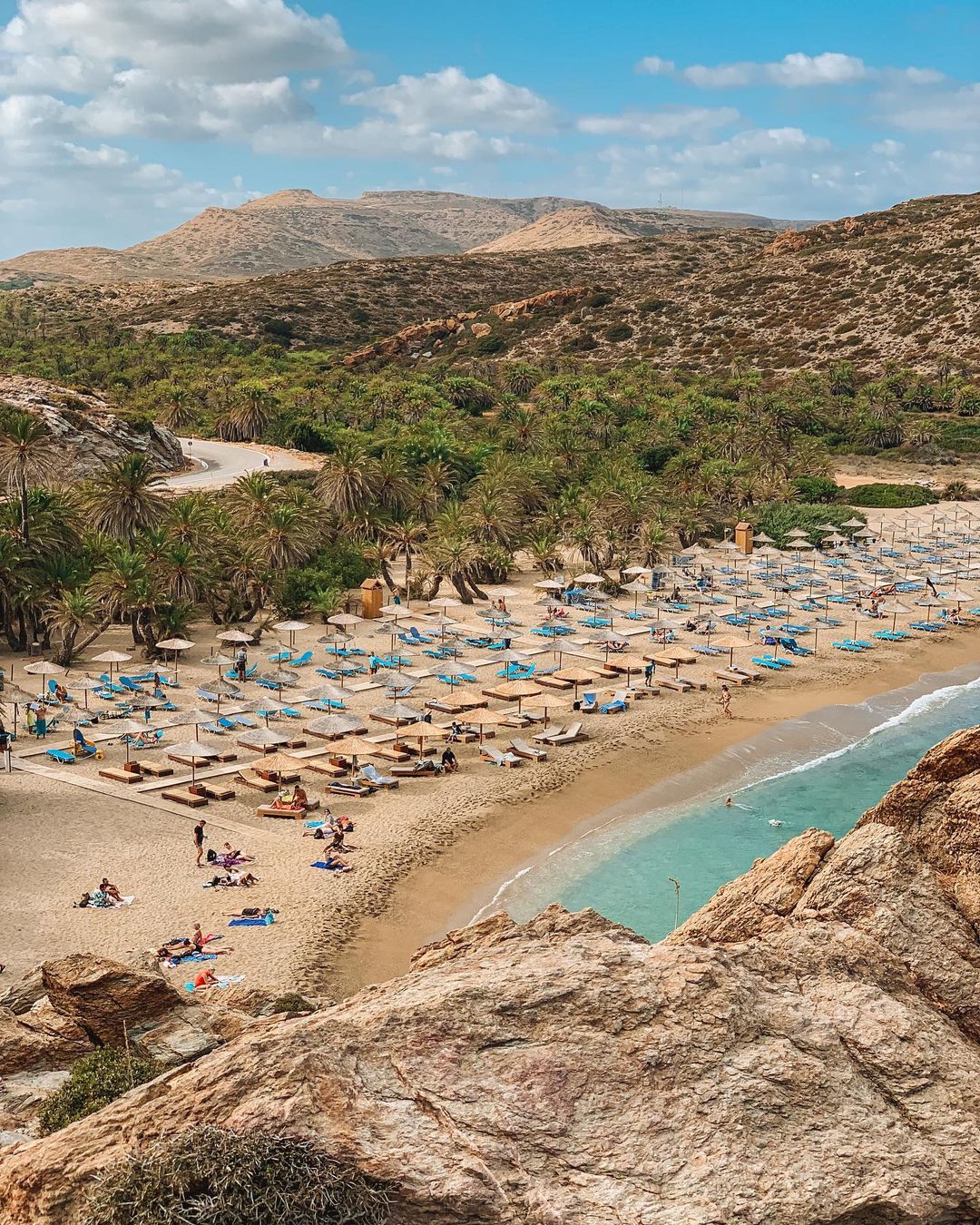
@lostinluxembourg
Transport yourself to a tropical paradise within Greece at the Vai Palm Forest in Lassithi, Crete. This unique sanctuary boasts over 5,000 palm trees, standing tall against the backdrop of golden sands and crystal-clear waters. Legend has it that these palms were planted by Saracen pirates or ancient Egyptian soldiers, adding an air of mystery to this natural wonder. Once a haven for hippies in the 1970s, the forest has undergone restoration efforts and now stands as a protected area, teeming with rare flora and fauna. Whether you're lounging on the beach or exploring the lush greenery, a visit to Vai is sure to leave you spellbound.
Steni Aesthetic Forest
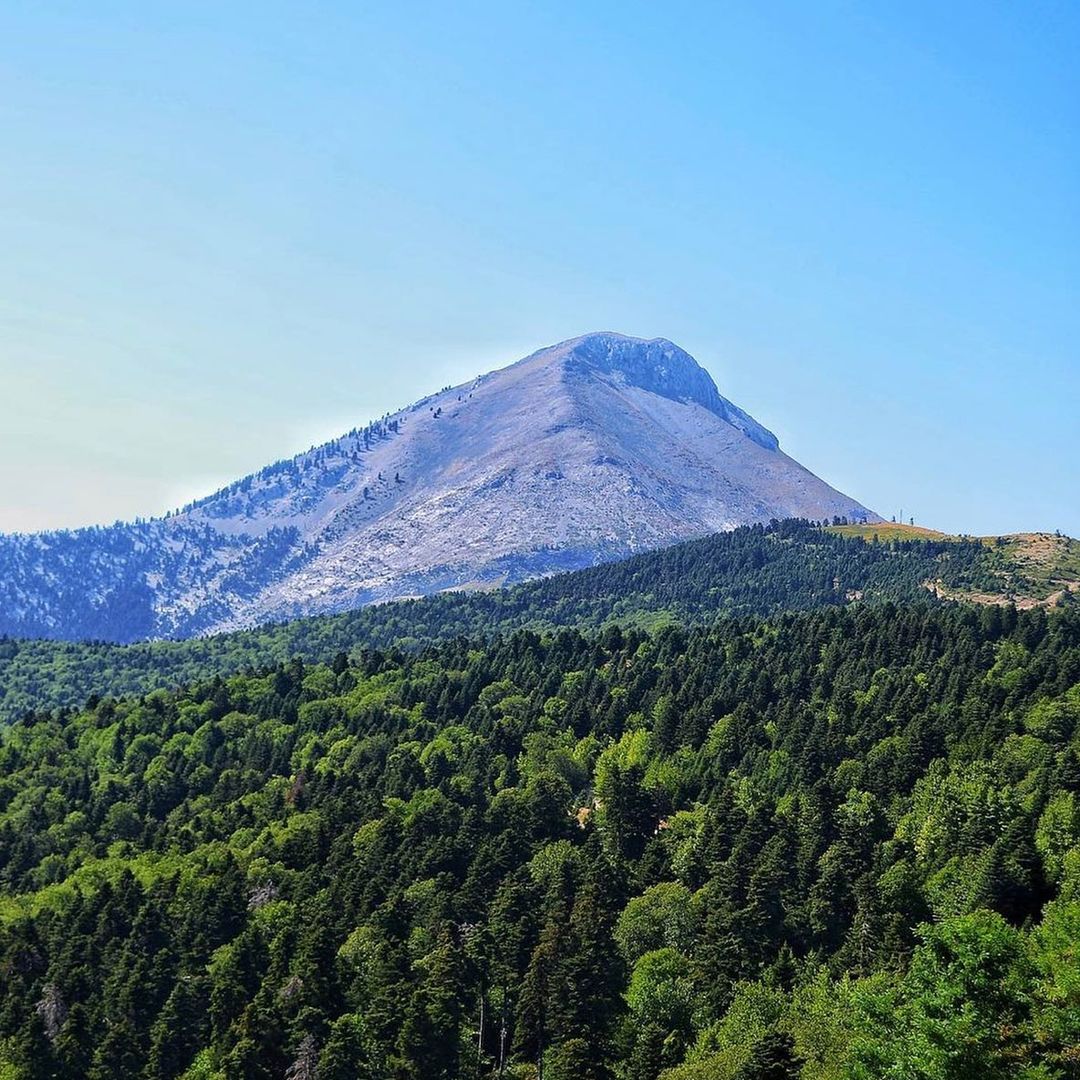
@stavrossif

@stavrossif
Tucked away on the southern slope of Mount Dirfys in Central Evia, the Steni Aesthetic Forest is a haven for nature enthusiasts year-round. Spanning 500 hectares, this enchanting woodland astounds travelers with its diverse landscapes and abundant biodiversity. From cascading streams to dense vegetation, including oaks, firs, and chestnuts, it offers a glimpse into the untamed beauty of Greek nature. Whether you're embarking on a leisurely stroll or seeking adventure through its rugged terrain, the Steni Forest promises an unforgettable experience for all who wander its paths.
Tithorea Forest
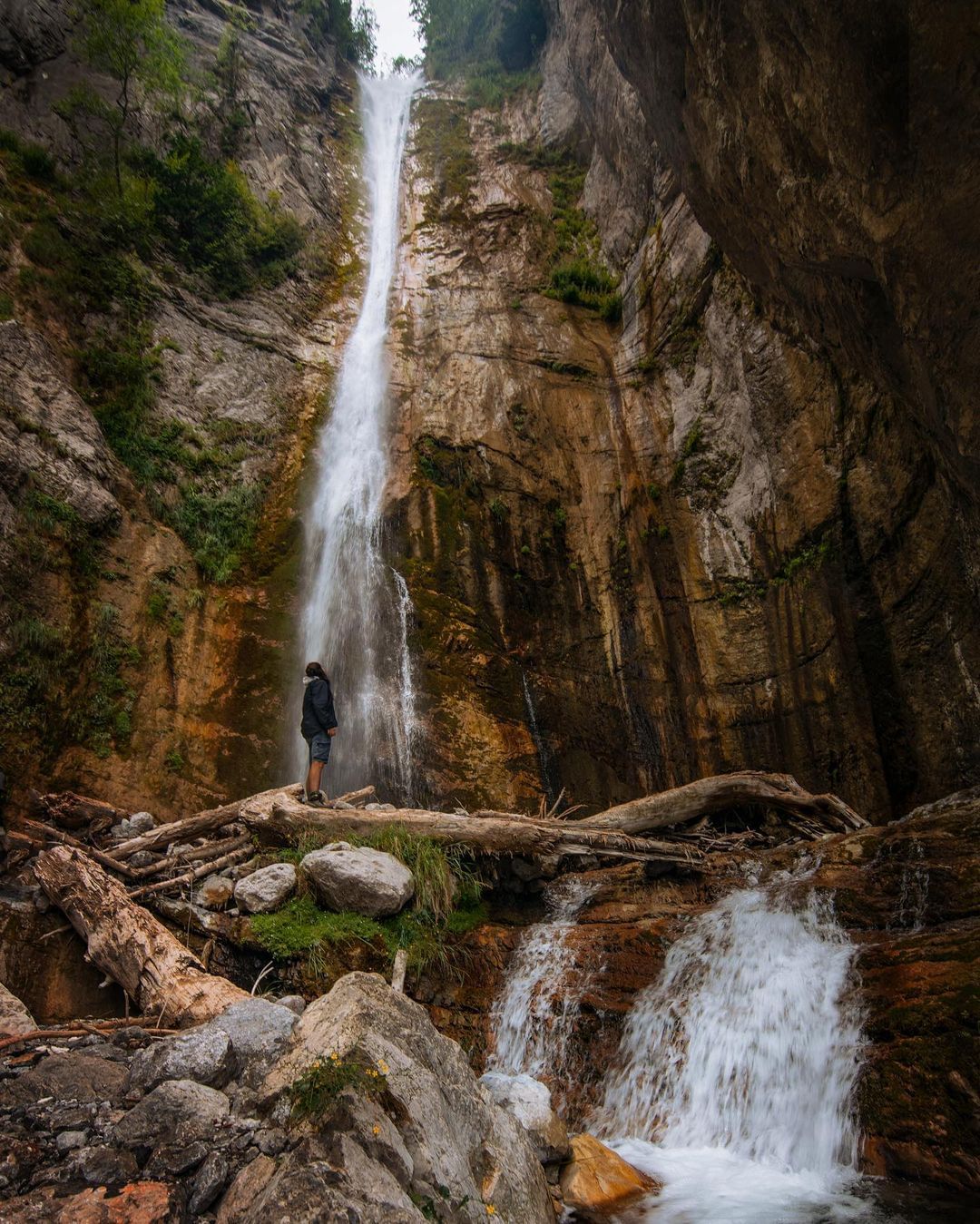
@mikelapardas

@mikelapardas
On the south side of Tithorea lies a verdant paradise spread across 2,000 acres, known simply as the Tithorea Forest. Here, towering firs, pines, and oaks create a landscape of unparalleled beauty, drawing nature lovers and outdoor enthusiasts alike. With its varied terrain and geomorphological formations, including steep rocks and winding paths, it's a playground for exploration. Venture deeper into the forest, and you'll discover ancient relics, including a tower and remnants of an ancient wall dating back to the 3rd–4th century.
Aesthetic Ossa Forest

@iliasnikoloulis

@iliasnikoloulis
Dive into the rich biodiversity of Greece at the Aesthetic Forest of Ossa, where rare species and diverse ecosystems await. Stretching across extensive mountainous meadows and rocky limestone formations, this forest is a marvel of nature's design. From deciduous broadleaf trees to chestnuts and beeches, each corner of the forest tells a story of resilience and adaptation. Explore the winding forest roads and hidden trails, and you'll encounter breathtaking vistas and encounters with rare wildlife. As you traverse this natural wonderland, you'll be reminded of the importance of preserving our planet's precious ecosystems for future generations to enjoy.
Published in
Travel Greece
Tagged under
Saturday, 27 April 2024 07:00
Waiting For Godot At Theatre Of The NO
Theatre Of The No, the first English-speaking theatre in Athens, proudly announces its grand opening with Samuel Beckett’s timeless masterpiece, "Waiting for Godot" on April 18th. Directed by Nikos Dionysios with a brilliant international cast, this brave production brings new energy and innovation to the most important theatrical play of the 20th century.
"Waiting for Godot" is justifiably iconic, a masterpiece of modern existential theatre, that explores profound themes through the lens of two protagonists Estragon and Vladimir, who find themselves in a perpetual cycle of waiting the arrival of a mysterious figure. Two loners, who depend on each other by waiting for something that does not come, two others who are connected through the authority of the ruled and a child.
Beckett skilfully weaves together themes of loneliness, dependency, and the relentless pursuit of meaning in a world devoid of certainty. Through layers of symbolism and multi-dimensional writing, the writer challenges audiences to confront the enigma of existence and grapple with the fundamental question, "Who am I ?"
"Is it a drama? Maybe a comedy? Nothing? Perhaps this classic play, defies easy categorization and reflects the artistic team behind Theatre of the No who seeks to explore the multi-layered complexities of Beckett's narrative.
Yoel Wulfhart, founder of the theatre, writes: “With its exciting inaugural production, Theatre of the No aims to establish itself as a hub for artistic innovation and cultural exchange, fostering dialogue and collaboration within the vibrant community of Athens. By bringing together diverse voices and perspectives, our theatre seeks to create transformative experiences that resonate with audiences long after the curtain falls."
Performances: Every Thursday, Friday, Saturday, Sunday, Monday at 20.30
Yoel Wulfhart, founder of the theatre, writes: “With its exciting inaugural production, Theatre of the No aims to establish itself as a hub for artistic innovation and cultural exchange, fostering dialogue and collaboration within the vibrant community of Athens. By bringing together diverse voices and perspectives, our theatre seeks to create transformative experiences that resonate with audiences long after the curtain falls."
Performances: Every Thursday, Friday, Saturday, Sunday, Monday at 20.30
About the Theatre Of The No
The Theatre of the NO is a brand new English-speaking theatre opening on April 2024 in the centre of Athens. We embrace diversity and creativity, welcoming new writers and creators from Greece and around the world to share their voices on our stage.
From thought-provoking dramas to avant-garde experiments, our programming will encompass a wide range of genres and styles, including Modernist, Absurdist, and Experimental Theatre, Music, Poetry and Performance Art.
CAST
Director: Nikos Dionysios
Assistant Director: Fivi Fildissi
Vladimir: David Gilliam
Estragon: Vassia Vassiliou
Pozzo: George Housakos
Lucky: Anastasia Booyaca
Child: Sebastian Puentes
Sets and Costumes: Bianca Nikolareizi
Sets and Costumes Αssistant: Iris Emilsntotir
Lighting Designer: Fernanda Balcells
Production Assistant: David Rawstron
Photographer: Nikos Pagonakis
Social Media: Petra Tseliou
Communications & Publicity: Eleftheria Sakareli
Executive Producer: Yoel Wulfhart - Fail Better Productions
Published in
Performing Arts
Tagged under
Friday, 12 April 2024 12:03
Introducing Athens' New Cultural Hub: Theatre Of The NO
In the bustling heart of Athens, a new beacon of cultural vibrancy has emerged: Theatre of the NO. Breaking ground as the city's first English-speaking theater, this innovative venue promises to redefine the theatrical landscape of the Greek capital.
For years, Athens has been celebrated as a global hub for arts and culture. From its ancient roots in drama to its modern-day celebration of performance art, the city has always embraced the transformative power of theater. However, until now, there has been a notable absence of English-language theater experiences catering to a diverse audience.
Enter the Theatre of the NO, located in the Plateia Vathis area of Metaxourgio. This dynamic new venue boasts a diverse ensemble of Greek and international actors, united by a shared passion for the theater of the absurd. Here, audiences can expect a captivating repertoire that spans the spectrum from classic to contemporary, with a dash of experimental flair thrown into the mix.
Enter the Theatre of the NO, located in the Plateia Vathis area of Metaxourgio. This dynamic new venue boasts a diverse ensemble of Greek and international actors, united by a shared passion for the theater of the absurd. Here, audiences can expect a captivating repertoire that spans the spectrum from classic to contemporary, with a dash of experimental flair thrown into the mix.
Kicking off its inaugural season with Samuel Beckett's iconic "Waiting for Godot," Theatre of the NO sets the stage for an unforgettable journey through the realms of existential musings, profound character studies, and biting satire. From the whimsical to the thought-provoking, each production promises to challenge, inspire, and captivate audiences of all ages.
"We promise that our performances will inspire you, challenge you, and change you. See the world in new ways, question old ideas, and be part of the most important conversations of our time."
But Theatre of the NO is more than just a venue for entertainment—it's a cultural movement. With a firm commitment to rejecting conventions and embracing the avant-garde, this theater stands as a testament to the transformative power of art. From its rejection of political correctness to its celebration of diversity and creativity, Theatre of the NO invites audiences to embark on a journey of self-discovery and exploration.
"At Theatre of the NO, we say NO to duplicity, NO to political correctness, and NO to filters. We do it our way, we will try, and we will see what happens."
Central to the theatre's mission is its dedication to fostering community and connection. Audience members are invited to arrive an hour before curtain time to mingle with fellow theatergoers and engage in lively discussions with actors, directors, and other guests following each performance. Here, the boundaries between stage and audience blur, creating an immersive and interactive theater experience unlike any other.
Founded by playwright Yoel Wulfhart and supported by a diverse team of artists and volunteers from around the world, Theatre of the NO represents a bold new chapter in Athens' cultural narrative. From its eclectic repertoire to its commitment to innovation and inclusivity, this theater is poised to become a cornerstone of the city's artistic landscape for years to come.
So, if you're ready to embark on a journey of discovery and transformation, look no further than Theatre of the NO. Join us as we challenge conventions, defy expectations, and celebrate the boundless possibilities of the human imagination. The stage is set, the lights are dimmed—let the show begin!
Upcoming Program at Theatre of the NO:
- April 18 - May 13: "Waiting for Godot" by Samuel Beckett
- May 17 - June 24: "Lust Lunch" by Yoel Wulfhart
- June 28 - August 5: "Venus in Fur" by David Ives
- August 9 - September 16: "Focus Group / Resistance in the Time of Peace" by Marco Di Stefano / Jibbe Willems
- September 20 - October 28: "Bachelors and Bachelorettes" by Hanoch Levin
- November 1 - December 9: "I am the Labyrinth" by DarkplayTheatre Theatre for thinking people
Published in
City Discovery
Tagged under
Thursday, 11 April 2024 12:16
The Magical Café Of Symi Island
Step into the enchanting world of Symi, where every cobblestone street whispers tales of tradition and every sun-kissed corner beckons with warmth and hospitality. In “The Magical Café of Symi Island,” a captivating children’s book penned by Thalia Laughlin and Mark Christou, readers of all ages are invited on an unforgettable journey through the heart of this idyllic Greek island.
About the Book
Born from a deep love and appreciation for the vibrant community of Symi, “The Magical Café of Symi Island” is a heartfelt tribute to the island’s rich culture, timeless beauty, and unwavering sense of community. Inspired by the authors’ own experiences and encounters with the island’s charming inhabitants, the story follows the adventures of Maroula’s café, a beloved gathering place where locals and visitors alike come together to share stories, laughter, and delicious treats. As the pages come alive with vivid illustrations and whimsical storytelling, readers are transported to Maroula’s café, where they meet a cast of characters inspired by real-life Symi residents.


From Maroula, the warm and welcoming café owner, to Georgios, the jolly vegetable seller, Andonis, the cheerful fisherman, and, of course, Papou Giannis with his unique stories of Symi’s past, each character embodies the unique spirit of Symi and its people. Through their interactions and adventures, readers are introduced to the timeless traditions, mouthwatering cuisine, and captivating culture that define life on this picturesque island.
Why You’ll Love It
“The Magical Café of Symi Island” is more than just a children’s book; it’s a celebration of the beauty, warmth, and magic that make Symi a truly special place. With its immersive storytelling and breathtaking illustrations, the book offers readers a window into the heart and soul of the island, inviting them to explore its hidden treasures and timeless traditions. From the sun-soaked streets and bustling markets to the tranquil shores and azure waters, every page is a feast for the senses, capturing the essence of Symi in all its splendor.


As you turn the pages, you’ll find yourself instantly transported to the island, filled with a sense of warmth and belonging that only this enchanting place can offer. With every word and illustration, your wanderlust awakens and leaves you dreaming of your next adventure to this idyllic Greek paradise.
About the Authors
About the Authors

Thalia Laughlin, a nomadic author with a passion for art and literature, draws upon her background in musicology and art therapy to craft stories that ignite the imagination and inspire creativity. Mark Christou, a longtime resident of Symi, brings his firsthand knowledge and love for the island to the pages of the book, infusing it with authenticity and warmth. Together, they have created a timeless tale that captures the spirit of Symi and invites readers to experience its magic for themselves.
Published in
Books
Tagged under
Thursday, 11 April 2024 10:43
Ancient Greek Roots Of The Olympic Torch Relay
In the cradle of civilization, where mythology intertwines with history, the flame of the Olympic Games first flickered to life. Rooted in the ancient traditions of Greece, the Olympic torch relay stands as a modern-day homage to the sacred bond between humanity and the divine.
The origins of the Olympic flame date back to ancient Olympia, where the Games were first held in 776 B.C. to honor Zeus, king of the gods. According to legend, a flame burned perpetually on an ancient shrine, erected by the ancient Greeks to honor Hera and nestled within the cypress-shaded sanctuary of Olympia, symbolizing the eternal spirit of the Games and the enduring pursuit of excellence.
Before the start of each Olympiad, a procession of priestesses, clad in flowing white robes adorned with laurel wreaths, would ignite a torch using the rays of the sun, carrying the sacred flame to the host city of the Games. Legend has it that they used a skaphia, a crucible positioned to capture the sun's rays. As sunlight converged within the vessel, it set ablaze on the dry grass, birthing the eternal symbol of the Olympic spirit.
The tradition of the Olympic flame was rekindled in the modern era during the 1928 Amsterdam Games, where it burned fervently at the entrance to the Olympic Stadium, captivating the public's imagination. Conceived by Dr. Carl Diem of Germany, the modern Torch Relay drew inspiration from ancient Greek depictions and the writings of Plutarch. Dr. Diem's vision materialized in the form of the first relay, stretching from Olympia to Berlin as part of the grand Opening Ceremony of the 1936 Olympic Games. On July 20, 1936, a Greek torchbearer named Konstantin Kondylis embarked on a historic journey, igniting a tradition that would become an integral facet of every subsequent Olympic Games.
Before the start of each Olympiad, a procession of priestesses, clad in flowing white robes adorned with laurel wreaths, would ignite a torch using the rays of the sun, carrying the sacred flame to the host city of the Games. Legend has it that they used a skaphia, a crucible positioned to capture the sun's rays. As sunlight converged within the vessel, it set ablaze on the dry grass, birthing the eternal symbol of the Olympic spirit.
The tradition of the Olympic flame was rekindled in the modern era during the 1928 Amsterdam Games, where it burned fervently at the entrance to the Olympic Stadium, captivating the public's imagination. Conceived by Dr. Carl Diem of Germany, the modern Torch Relay drew inspiration from ancient Greek depictions and the writings of Plutarch. Dr. Diem's vision materialized in the form of the first relay, stretching from Olympia to Berlin as part of the grand Opening Ceremony of the 1936 Olympic Games. On July 20, 1936, a Greek torchbearer named Konstantin Kondylis embarked on a historic journey, igniting a tradition that would become an integral facet of every subsequent Olympic Games.
Since its revival, the Olympic torch relay has paid homage to its Greek roots, tracing a path from Olympia to the host city of the Games, passing through historic landmarks and ancient ruins along the way. The torchbearers, adorned in ceremonial attire reminiscent of ancient Greek athletes, don traditional tunics and sandals, their heads crowned with wreaths of olive leaves, symbolizing victory and peace.
Memorable moments from past torch relays harken back to the glory of ancient Greece, evoking the spirit of Olympians who once competed in the shadow of Mount Olympus. From the sun-drenched shores of the Aegean Sea to the rugged peaks of the Peloponnese, the torch has journeyed across the land of its birth, echoing the footsteps of ancient athletes who once vied for glory in the stadium of Olympia.
As the flame passes from hand to hand, it carries with it the hopes and aspirations of generations past and present, uniting people in a shared celebration of human achievement. In its flickering light, we find a timeless connection to the spirit of ancient Greece, where the pursuit of excellence was not merely a competition but a divine calling, worthy of the gods themselves.
In reviving the ancient tradition of the Olympic torch relay, we pay homage to the legacy of ancient Greece, where the flame of the Games first illuminated the hearts and minds of humanity. Today, as we gather to witness the passing of the torch, let us remember the enduring spirit of the Olympians who came before us, and the timeless ideals they embodied.
Main Image Credit: @xws.studio
Main Image Credit: @xws.studio
Published in
Greek Philosophy & History
Tagged under
Wednesday, 10 April 2024 23:36
Unforgettable Olympic Tales: Triumphs, Heroes & Resilience
The Olympic Games are not just about athletic prowess; they're also filled with remarkable stories, astonishing achievements, and unforgettable moments.
From groundbreaking milestones to incredible displays of resilience and determination, here are some of the most wow facts about the Olympic Games that will leave you in awe!
From groundbreaking milestones to incredible displays of resilience and determination, here are some of the most wow facts about the Olympic Games that will leave you in awe!
1. Kallipateira: The Trailblazing Woman
In ancient Greece, women were not allowed to compete or even attend the Olympic Games. However, one woman, Kallipateira, defied convention and made history. Disguising herself as a man, she entered the Olympic stadium to watch her son, Peisirrodos, compete in wrestling. When he won, she couldn't contain her joy and accidentally revealed her true identity. Rather than face punishment, Kallipateira was celebrated for her devotion and bravery, becoming the first woman to enter the Olympic Games.
2. Spyros Louis: The Marathon Marvel
In 1896, at the inaugural modern Olympic Games held in Athens, Greece, Spyros Louis captured the hearts of his nation and the admiration of trailing behind favored competitors from more established running nations. However, fueled by the cheers of his fellow Greeks lining the streets of Athens, Louis refused to succumb to the scorching heat and exhaustion. In a stunning turn of events, Louis surged ahead in the final leg of the race, overtaking his rivals and crossing the finish line at the Panathenaic Stadium to claim the gold medal. His unexpected triumph sparked jubilant celebrations throughout Greece, marking a symbolic victory for the host nation and forever etching his name into Olympic history.
3. Jesse Owens: Defying Adversity
At the 1936 Berlin Olympics, amidst the backdrop of Nazi Germany's propaganda of Aryan superiority, African-American athlete Jesse Owens delivered a stunning rebuke. Owens won four gold medals in track and field, disproving Hitler's ideology and cementing his place as one of the greatest athletes of all time. His triumphs transcended sports, sending a powerful message of courage, equality, and resilience in the face of adversity.
4. Abebe Bikila: Running Barefoot to Glory
In 1960, Ethiopian runner Abebe Bikila made history at the Rome Olympics by winning the marathon barefoot. Due to shoe discomfort, Bikila decided to run the race without shoes, a decision that astonished spectators and defied conventional wisdom. Not only did Bikila win the marathon, but he also set a new world record, becoming the first African to win Olympic gold and inspiring generations of athletes with his remarkable feat.
5. Derek Redmond: A Father's Love
In one of the most heartwarming moments in Olympic history, British sprinter Derek Redmond tore his hamstring during the 400-meter semifinal at the 1992 Barcelona Olympics. Determined to finish the race, Redmond refused to quit, hobbling along the track in excruciating pain. Suddenly, his father, Jim Redmond, broke through security and rushed to his son's side, supporting him as they crossed the finish line together. Their emotional embrace epitomized the bond of love, sacrifice, and resilience, inspiring millions around the world.
6. The Greek Goddess: Voula Patoulidou's Historic Hurdle
In the 1992 Barcelona Olympics, Greek hurdler Voula Patoulidou etched her name into Olympic history with a stunning upset victory in the women's 100-meter hurdles. Against formidable competition, including reigning champion Gail Devers of the United States, Patoulidou surged ahead in the final meters to claim gold, becoming the first Greek woman to win an Olympic track and field title. Her triumph sparked jubilant celebrations across Greece, inspiring a new generation of athletes and solidifying her status as a national hero.
In the 1992 Barcelona Olympics, Greek hurdler Voula Patoulidou etched her name into Olympic history with a stunning upset victory in the women's 100-meter hurdles. Against formidable competition, including reigning champion Gail Devers of the United States, Patoulidou surged ahead in the final meters to claim gold, becoming the first Greek woman to win an Olympic track and field title. Her triumph sparked jubilant celebrations across Greece, inspiring a new generation of athletes and solidifying her status as a national hero.
7. Eric Moussambani's Courageous Swim
In the 2000 Sydney Olympics, Equatorial Guinean swimmer Eric Moussambani captured the hearts of spectators with his valiant effort in the men's 100-meter freestyle. Hailing from a country with limited resources and without access to proper training facilities, Moussambani had learned to swim in a hotel pool only eight months before the Games. Despite his lack of experience and preparation, Moussambani found himself competing on the world's biggest stage. In a race that became known as the "Eric the Eel" heat, Moussambani swam alone after his competitors were disqualified for false starts. Though he struggled to complete the distance, Moussambani's courage and perseverance endeared him to audiences worldwide, embodying the Olympic ideal of participation, sportsmanship, and the pursuit of personal excellence.
Published in
Greek Philosophy & History
Tagged under
Wednesday, 10 April 2024 16:17
A Brief History Of The Olympic Games
The Olympic Games, with their roots deeply embedded in ancient Greek culture, stand as a testament to humanity's enduring spirit of competition, athleticism, and unity.
Spanning millennia, this global sporting event has evolved from its humble beginnings to become one of the most celebrated and anticipated spectacles in the modern world.
Spanning millennia, this global sporting event has evolved from its humble beginnings to become one of the most celebrated and anticipated spectacles in the modern world.
Ancient Origins
The origins of the Olympic Games can be traced back to ancient Greece, where they were held in Olympia, a sanctuary dedicated to Zeus, the king of the gods. The earliest recorded Olympic Games date back to 776 BC, although it is believed that they may have begun even earlier, around the 8th century BC.
The Ancient Games
The ancient Olympics were held every four years, a period known as an Olympiad, and were part of a religious festival honoring Zeus. Athletes from various Greek city-states would gather to compete in a variety of events, including running, wrestling, boxing, chariot racing, and the pentathlon, which consisted of running, jumping, discus and javelin throwing, and wrestling.
In the ancient Olympic Games, winners were not awarded monetary prizes or medals like in the modern Olympics. Instead, victors were honored with symbolic rewards, such as olive wreaths or crowns made from laurel leaves, which were highly esteemed symbols of victory and honor in ancient Greek culture. Additionally, victorious athletes were often celebrated as heroes in their hometowns, receiving lavish praise, gifts, and even lifetime pensions for their athletic achievements.
The ancient Olympic Games served not only as a platform for athletic competition but also as a symbol of unity among the Greek city-states. During the Olympics, a sacred truce known as the "Ekecheiria" was observed, allowing athletes and spectators to travel safely to and from Olympia without fear of conflict.
The End of an Era
The ancient Olympic Games continued for over a millennium, enduring various political, social, and economic changes. However, in 393 AD, the Roman Emperor Theodosius I banned all pagan festivals, including the Olympics, marking the end of the ancient Games after their 293rd Olympiad.
Revival of the Modern Olympics
It wasn't until the late 19th century that the Olympic Games were revived, thanks in large part to the efforts of French educator Baron Pierre de Coubertin. Inspired by the ancient Olympics and motivated by a desire to promote international understanding and peace, Coubertin proposed the idea of reviving the Games during the International Congress for the Reestablishment of the Olympic Games in 1894.
The First Modern Olympics
The inaugural modern Olympic Games were held in Athens, Greece, in 1896, with athletes from 14 countries competing in 43 events. Since then, the Olympic Games have grown in scale and popularity, attracting thousands of athletes from around the world to compete in a wide range of sports.
A Global Celebration
Today, the Olympic Games represent a global celebration of athleticism, sportsmanship, and unity. Held every four years, alternating between summer and winter editions, the Olympics bring together athletes from diverse backgrounds and cultures to compete on the world stage.
Over the years, the Olympic Games have evolved and expanded, incorporating new sports and disciplines to reflect changing trends and interests. In addition to traditional events like track and field, swimming, and gymnastics, the modern Olympics now feature a wide range of sports, including snowboarding, beach volleyball, and BMX cycling.
Impact and Legacy
The Olympic Games have had a profound impact on the world stage, serving as a platform for promoting peace, tolerance, and understanding among nations. They have also inspired countless individuals to pursue their athletic dreams and strive for excellence in their chosen fields. With each new edition, the Olympics continue to captivate audiences worldwide, leaving a lasting legacy of athleticism, camaraderie, and human achievement.
From its ancient origins in Olympia to its modern-day incarnation as a global sporting extravaganza, the Olympic Games have captured the imagination of people across the globe. With a rich history spanning thousands of years, the Olympics continue to inspire awe and showcase the boundless potential of the human spirit.
Published in
Greek Philosophy & History
Tagged under


